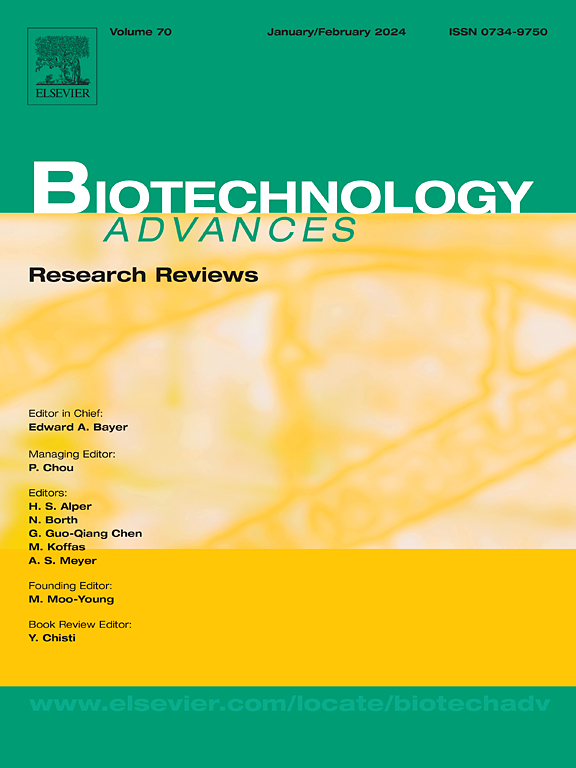面向全球细胞食品生产创新的精密发酵:挑战与机遇。
IF 12.5
1区 工程技术
Q1 BIOTECHNOLOGY & APPLIED MICROBIOLOGY
引用次数: 0
摘要
精密发酵代表了一种创新的基于细胞的生产方法,它采用合成生物学和代谢工程工具,通过利用“微生物细胞工厂”生产附加值成分,彻底改变了全球食品生产。然而,其全球实施受到技术和可扩展性瓶颈、监管碎片化、区域可及性和消费者接受度以及营养权衡挑战的阻碍。本综述利用案例研究和建模分析,详细探讨了精密发酵与全球细胞食品生产的交叉,讨论了可操作的研究差距和见解,以及先进的生物工程实践和分析技术,以应对正在进行的学术研究、工业应用和政策倡议中的这些挑战。从而支持发酵食品生产向高效和可持续制造的转变。此外,还关注诸如知识产权垄断和低资源地区公平获取技术等伦理问题。我们强调了合成生物学和代谢工程工具等关键要素,以及精密营养的进步,认识到它们在大规模发酵生产和市场采用中的关键作用,并详细阐述了关于潜在“营养饥饿”风险机制的“隐性饥饿”假设,并提出了缓解策略。采用计算机辅助工程(CAE)、人工智能(AI)和自动化来改进发酵过程为提高生产效率和可持续性提供了有希望的途径,同时也讨论了这些工具的局限性和研究重点。我们进一步提出了一个有远见的框架,其中即将到来的食品创新满足消费者对健康和环境责任的期望,最终推动发酵食品领域进入一个技术成熟和社会影响的新时代。本文章由计算机程序翻译,如有差异,请以英文原文为准。
Intersecting precision fermentation for global cell-based food production innovation: Challenges and opportunities
Precision fermentation represents an innovative cell-based production approach that employs synthetic biology and metabolic engineering tools, revolutionizing global food production by utilizing “microbial cell factories” to produce added-value ingredients. However, its global implementation is hindered by technological and scalability bottlenecks, regulatory fragmentation, regional accessibility and consumer acceptance, and nutritional trade-offs challenges. This review utilizes illustrated case studies and modeling analysis to present a detailed exploration of precision fermentation intersecting with global cell-based food production, discussing actionable research gaps and insights as well as advanced bioengineering practices and analytical techniques, to address these challenges for ongoing academic research, industrial applications and policy initiatives, thus supporting the transition of fermentation-enabled food production toward efficient and sustainable manufacturing. Moreover, attention is also dedicated to ethical concerns such as intellectual property monopolies and equitable technology access in low-resource regions. We highlighted crucial elements such as synthetic biology and metabolic engineering tools with advancements in precision nutrition, recognizing their crucial roles in large-scale fermentation-enabled production, market adoption, and elaborating on the “hidden hunger” hypotheses regarding the mechanism of potential “Nutritional starvation” risk and proposing mitigation strategies. Adopting computer-aided engineering (CAE), artificial intelligence (AI), and automation to refine fermentation processes presents promising avenues for enhancing production efficiency and sustainability, while the limitations of these tools and research priorities are also discussed. We further propose a visionary framework where upcoming food innovations meet consumer expectations for health and environmental responsibility, ultimately propelling the field of fermented food into a new era of technological sophistication and societal impact.
求助全文
通过发布文献求助,成功后即可免费获取论文全文。
去求助
来源期刊

Biotechnology advances
工程技术-生物工程与应用微生物
CiteScore
25.50
自引率
2.50%
发文量
167
审稿时长
37 days
期刊介绍:
Biotechnology Advances is a comprehensive review journal that covers all aspects of the multidisciplinary field of biotechnology. The journal focuses on biotechnology principles and their applications in various industries, agriculture, medicine, environmental concerns, and regulatory issues. It publishes authoritative articles that highlight current developments and future trends in the field of biotechnology. The journal invites submissions of manuscripts that are relevant and appropriate. It targets a wide audience, including scientists, engineers, students, instructors, researchers, practitioners, managers, governments, and other stakeholders in the field. Additionally, special issues are published based on selected presentations from recent relevant conferences in collaboration with the organizations hosting those conferences.
 求助内容:
求助内容: 应助结果提醒方式:
应助结果提醒方式:


